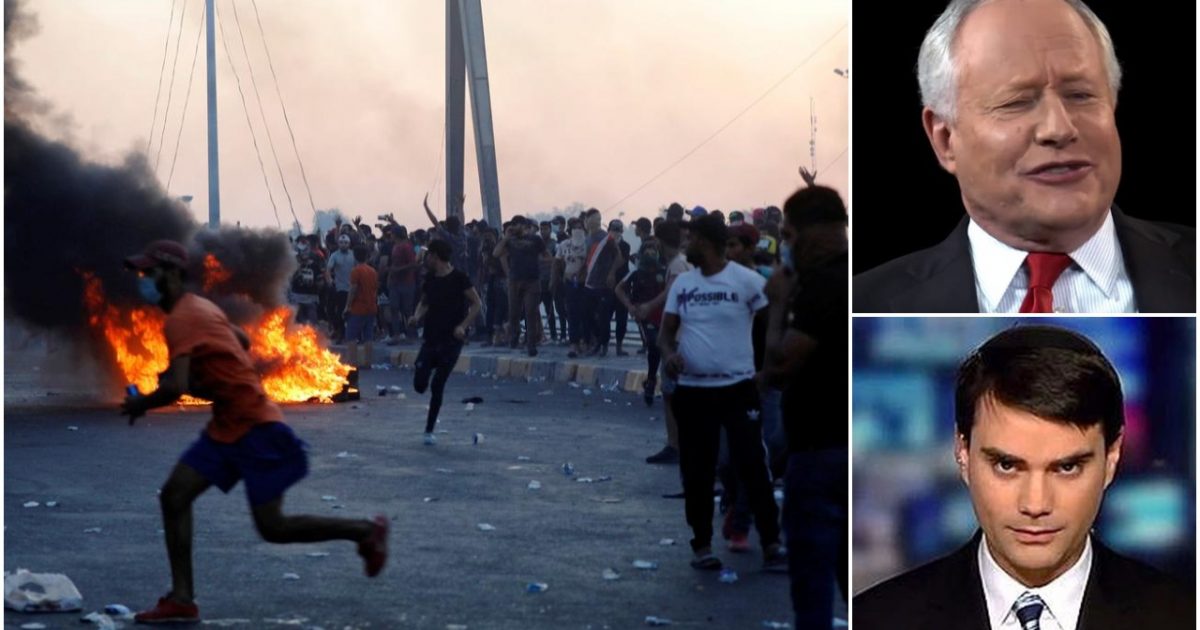
Over 100 people have died as civil unrest flares up throughout Iraq, as the democracy that the United States waged war to put into place disintegrates.
On Sunday, 12 protesters were killed during protests in Baghdad. Saad Maan, a spokesman for the Iraqi Ministry of Interior, claims that anti-government protesters have burned down 51 public buildings and eight political party headquarters. The regime refuses responsibility for the deaths and blames “malicious hands” for targeting security members and protesters alike.
The official death count stands at 104, with over 6,100 individuals wounded since the unrest broke out last Tuesday. Iraq’s prime minister, Adel Abdul-Mahdi, now wants to have talks with the protesters to quell unrest and has ordered security forces to use non-lethal rounds on protesters unless it’s for the purpose of self-defense.
“We can’t accept the continuation of the situation like this,” Abdul-Mahdi told his cabinet on Saturday. “We hear of snipers, firebombs, burning a policeman, a citizen.”
“I am ready to go wherever our brotherly protesters are and meet them or send them envoys to other locations without any armed forces,” Abdul-Mahdi said. “I will go and meet them without weapons and sit with them for hours to listen to their demands.”
Bilal Wahab, Iraq policy expert at The Washington Institute for Near East Policy, explained to Euronews that Iraqis are unimpressed with their new democratic system. They want a total overhaul of the politics imposed upon them by Western interventionists.
“The new Iraqi government has had a year to tackle unemployment and corruption. Obviously the people have spoken with their feet by taking the largest squares, not only in Baghdad but in many other cities and towns in southern Iraq,” Wahab said.
“They are not happy with the level of progress made in creating jobs for them and with the level of corruption,” he added. “These protests are sporadic, spontaneous, they are leaderless. They are a continuation of the protests that took place last July 2018 in Basora, the oil heartland of this country.”
Wahab explains that the people are longing for the good ol’ days when autocrat Saddam Hussein was in power over Iraq.
“People elected a new government, a new leadership, and yet it seems that the system of Iraq’s government, the new system post-2003, post-Saddam Hussein, is failing,” Wahab said. “It’s been a system of sectarian divide of power and authority and doling out patronage and revenues.”
“While that has worked for a while, because it provided public sector jobs for followers and cronies and supporters, mainly on identity and political basis. But there only so many jobs and so many seats in these government offices,” he added. “The government has so far failed to open up the private sector where the majority of jobs will be created.”
The neoconservatives who pushed America into a bloody Iraq war back in 2003 sold the public on the lie that democracy would sweep through the nation and be an improvement from Saddam’s regime.
“The United States committed itself to defeating terror around the world. We committed ourselves to reshaping the Middle East, so the region would no longer be a hotbed of terrorism, extremism, anti-Americanism, and weapons of mass destruction. The first two battles of this new era are now over. The battles of Afghanistan and Iraq have been won decisively and honorably,” neocon pundit Bill Kristol wrote in a Weekly Standard column in 2003.
“I think we’ll be vindicated when we discover the weapons of mass destruction and when we liberate the people of Iraq,” Kristol said during an appearance on ABC’s Nightline in 2003.
“We will succeed in Iraq, just like we did in Afghanistan. We will stand up a new government under an Iraqi-drafted constitution. We will defeat that insurgency, and, in fact, it will be an enormous success story,” former Vice President Dick Cheney said during a CNN interview in 2005.
“No one said empire was easy, but it is right and good, both for Americans and for the world,” war hawk Ben Shapiro wrote in a Townhall op/ed that same year. “Forwarding freedom is always important, but it is especially important where doing so ensures America’s future security — as in Iraq.”
The prognostications from the neocons are some of the most stunningly inaccurate forecasts in U.S. history, and their legacy of war crimes continues to have deadly ramifications in Iraq to this very day.



